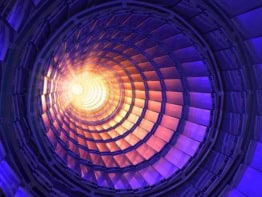Secret letters written by the Danish physicist Niels Bohr about his famous 1941 meeting with Werner Heisenberg – then head of Germany's nuclear programme – are released today by the Niels Bohr Archive in Denmark. The draft letters to Heisenberg, which Bohr never sent, reveal that Heisenberg had been working flat-out for the previous two years on an atomic bomb and was convinced that the Germans would win the Second World War. Bohr also says in the letters – which he wrote in the early 1960s – that he did not believe claims that Heisenberg made after the war that German physicists had wanted to prevent construction of an atomic bomb.
The war-time meeting between Bohr and Heisenberg has long been shrouded in mystery and was the basis of Michael Frayn’s hugely successful play Copenhagen. However, historians of science who have tried to decipher what happened at the meeting have been forced to rely on Heisenberg’s post-war recollections – which have been ambiguous and contradictory – along with scraps of evidence from secondary sources. The publication of the eleven letters will give historians a valuable source of new material. The letters were originally due to be released in 2012 – fifty years after Bohr’s death – but his family have chosen to release them early to avoid any ‘misunderstanding regarding their contents’.
Much of the controversy centres on claims made by Heisenberg that appeared in Robert Jungk’s 1958 book Brighter Than a Thousand Suns. Jungk claims that Heisenberg had formulated a plan to prevent the development of an atomic bomb through a mutual agreement between German and Allied physicists. In the newly released letters, however, Bohr says that he does not believe that Heisenberg ever hinted that German physicists would do all they could to prevent an atomic bomb.
Bohr emphasizes several times in the letters that he has a clear memory of the meeting – and took very careful note of what Heisenberg said – because it was such an important matter. He claims that Heisenberg was convinced that if the war did not end with a German victory, then it would be decided by the use of atomic weapons. Bohr says that his own silence during the meeting was not because he was shocked to learn that fission was technically feasible – as Heisenberg later claimed – but because he had not realised Germany was working on a bomb. Bohr adds that he did not realise that the Allies were working on a bomb until he escaped to Britain in 1943.
The letters also reveal that Heisenberg came to Copenhagen to help Bohr and other Danish physicists and to explain to them that the Danes’ attitude to Germany was unreasonable. Heisenberg, Bohr claims, argued that the Danes should co-operate with the Germans because they were bound to win the war. Bohr also insists that Heisenberg’s recollection of the meeting was clouded by the fact that Germany’s hopes of winning the war – which in 1941 had seemed strong – faded away as the war neared its end.
Finn Aaserud, director of the Niels Bohr Archive, warns that the letters should be viewed with caution. ‘All the documents were written sixteen years or more after the event they seek to describe,’ he says. ‘Even though the documents show a genuine concern on the part of Bohr to formulate his own recollection of what transpired in 1941, most – if not all – of them were written as reactions to the writings or questions of others and do not reflect Bohr’s main interests and activities at the time.’



